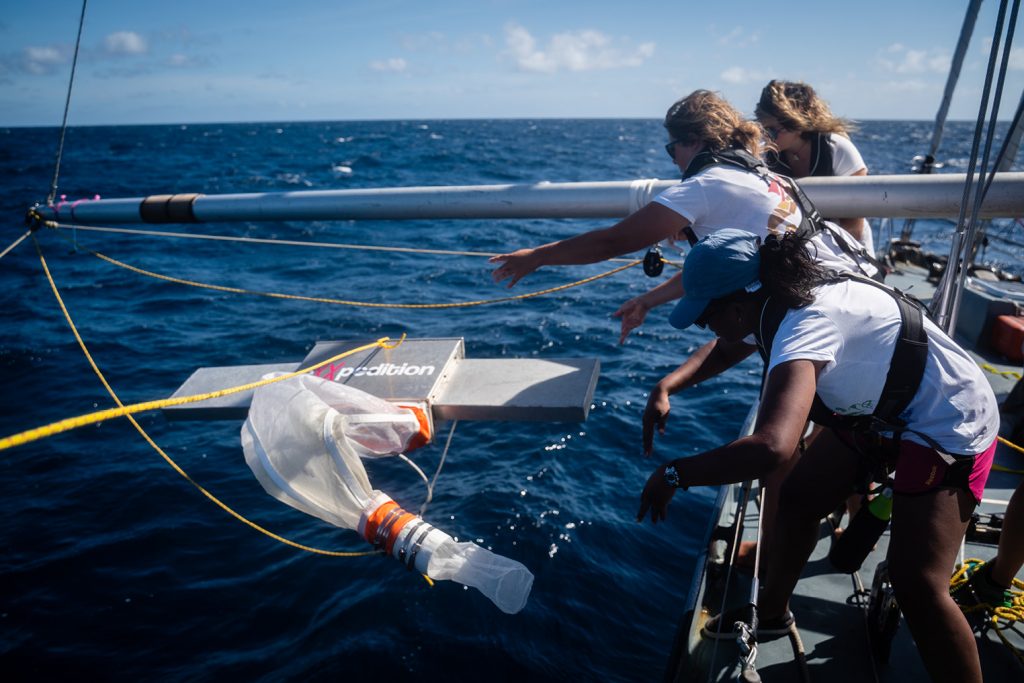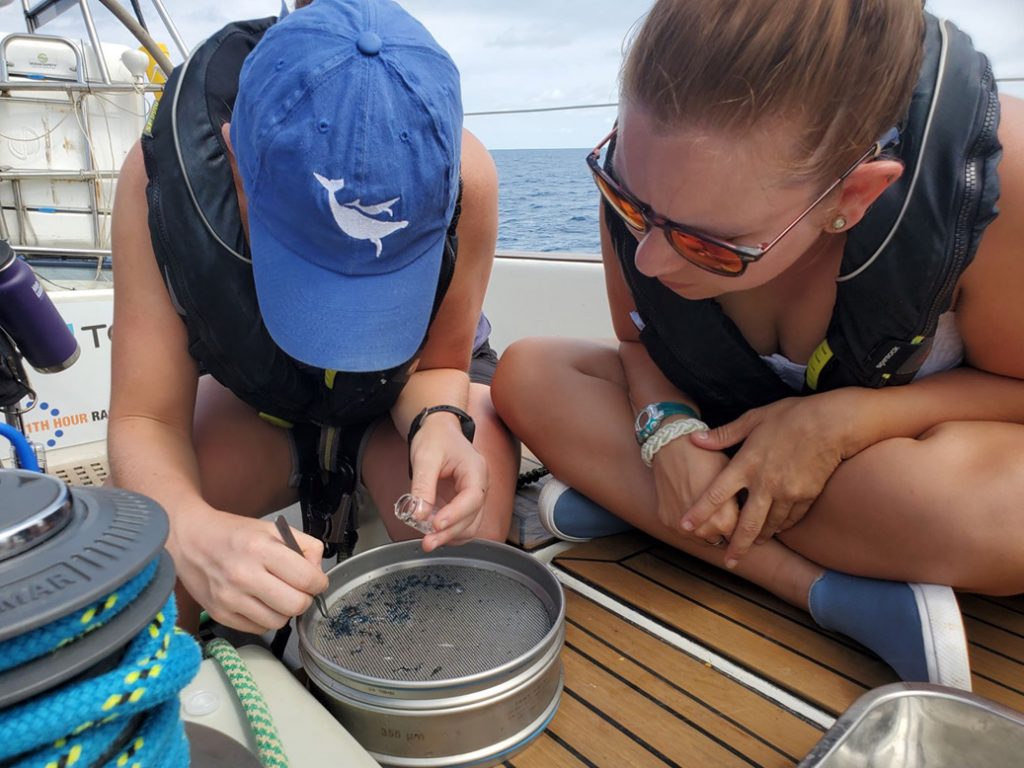By Juliana Corrales, eXXpedition Ambassador
Editor’s note: Author Juliana Corrales sailed as a guest crew on Leg 7 of eXXpedition Round the World (RTW), an all-female, three-year sailing voyage and environmental mission that began in the United Kingdom in October 2019 and finishes there in September 2022. On board SV TravelEdge, a total of 300 women are sailing thirty voyage legs that will cover more than 38,000 nautical miles.
Co-founded in 2014 by Mission Director Emily Penn, eXXpedition is a non-profit organization that runs pioneering all-female sailing research expeditions to investigate the causes and solutions to ocean plastic pollution. RTW crews are exploring plastics and toxins in our ocean, via four of the five oceanic gyres and the Arctic.

After experiencing firsthand the challenges we face from single-use plastics and contributing to cutting edge scientific research and solutions-based thinking, Juliana is spreading the word as an eXXpedition Ambassador. To learn more about this remarkable mission, visit eXXpedition.com. This article was originally published at exxpedition.com/news/blog, and is reprinted with permission. Special thanks to Larissa Clark, eXXpedition’s Head of Communications.
My name is Juliana, and I was very fortunate to be selected as the first Costa Rican (of many, I hope!) to be part of the amazing crew of eXXpedition’s Leg 7, as part of the Round the World Voyage. During this voyage, we sailed through the South Pacific Gyre, from the biodiverse islands of Galapagos to the magical and isolated Easter Island. It was a life changing experience and surprisingly enough, an experience that was going to shed light and perspective to the situation that was waiting for us in the ‘real world.’
I had the privilege to be onboard a 70-foot sailboat, alongside thirteen wonderful women from seven different countries, for fourteen days and 2009 nautical miles. We sailed with a clear objective: to find the causes and solutions to the plastic problem in our oceans. This was our main goal, but at the same time each one of us went through a journey of our own. Some more challenging than others, but at the end, we can all agree that it was a test of patience, resilience and strength. The women that came onboard on that 15th of February 2020, weren’t the same as the ones that touched land in Hanga Roa on the 2nd of March. We shared a transformational journey and came back stronger, ready to face the world and change it.
eXXpedition’s slogan is to ‘make the unseen, seen.’ The situation of plastic in our oceans has evolved from being a very visible problem, the idea of the famous “plastic island,” to a more complex, but less obvious problem: microplastics. The durability of plastic has become one of its greatest threats. It does not degrade in the way that plants and animals will; it only breaks down into smaller parts creating fragments that are almost invisible to our eyes. Through our experience this was made visible, most of the samples that we removed from the ocean revealed a reality that couldn’t be ignored. Through these transformational and investigative experiences, eXXpedition is creating a network of multidisciplinary female leaders inspired to focus their skills to change the way we feel, think, and act towards our oceans.
Intentional or not, being part of eXXpedition not only exposes the problem of plastic in our oceans, but also our close relationship with this ecosystem. This was my first time sailing in the open ocean, being at the mercy of the wind and the tides; and suddenly our dependence and intrinsic connection with nature became very evident. I consider myself quite aware of that link, but at that moment it became tangible. In order to move forward and succeed in our voyage we depended on the sea, the wind, the sudden changes in the weather; and most importantly, the ability to read them. Being in the middle of the Pacific Ocean made it very clear that it is our seas and oceans that connect us all. Physically connecting us, there is no place that we cannot reach through them.

The three focus areas of eXXpedition RTW’s science at sea mission are the composition and distribution of various plastics in surface water, subsurface water, and subtidal sediment. ©
Also, our reality in those fourteen days was limited to the 70 feet of our sailboat. We were all on the same boat and it was our responsibility to take care of it and take care of ourselves in order to reach our destination. As the days passed, we began to build a relationship of care and gratitude towards the sailboat and between us. We took care of each other, if one got sick another would take care of her making sure it wouldn’t escalate. We worked in shifts to keep us on track and safe. We cooked our food in a very strategic way so that it would last throughout the journey. We were living with the essentials only, because of the limited space. And most importantly, we were made very aware of the waste that we produced. It didn’t magically disappear as it does on land; we had to dispose of everything in the space in which we lived.
For me the whole experience was a perfect analogy of how we should live our lives on this planet, but of course, on a much smaller scale. We have become desensitized to the world around us and the impact that our actions have on it. We have forgotten what is essential and we take for granted all the natural processes that happen day by day for us to be able to be here, now.
Our planet is our boat, and although it feels so big, it also has its limits. We can see it in our seas, in the air we breathe, in the changes in our climates. We are reaching a crucial point where nature is forcing us to stop and start observing the world around us. Earth is ‘making the unseen, seen’ and it’s doing it in a very explicit way. In the same way that we could not have reached our destination alone, the global community will not be able to get out of this situation without helping each other.
The potential to make a difference is in every one of us, from living in our houses to saying “NO!” to that plastic bottle. It is important to give deserved value to those small, individual actions. Because in the end, the most important thing is to know that we sail this universe in the same boat. ■



